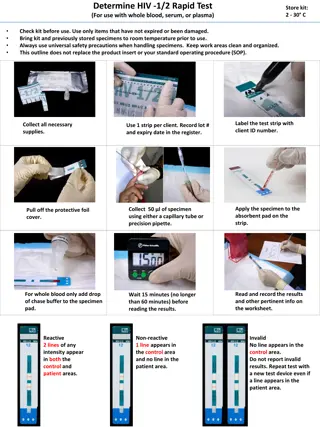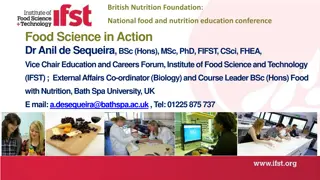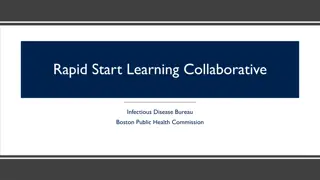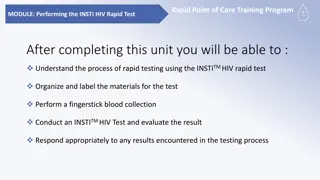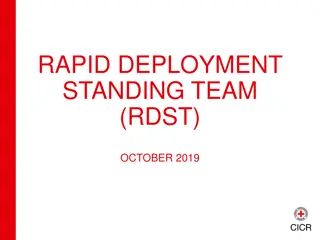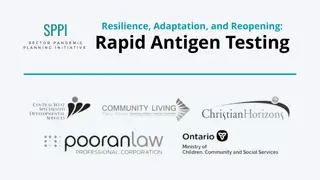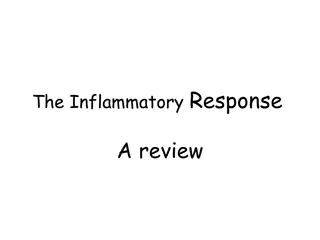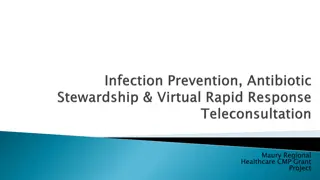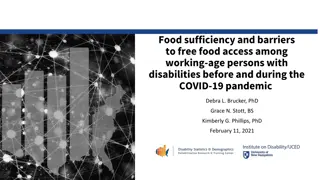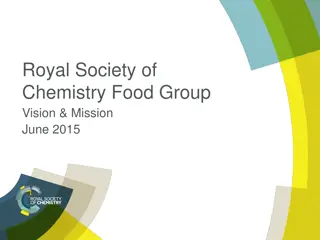Food Defense Training and Rapid Response Team Meeting Overview
Food Defense Training and Rapid Response Team Meeting provides insights into food security, food defense, and food safety to protect against intentional and unintentional contamination incidents. The presentation delves into incidents, policies, responses, and preparedness, emphasizing the importance of safeguarding the food supply chain. It also highlights case studies of intentional contamination events worldwide, such as economically motivated adulteration and incidents from the past, underscoring the need for vigilance and preventative measures in the food industry.
Download Presentation

Please find below an Image/Link to download the presentation.
The content on the website is provided AS IS for your information and personal use only. It may not be sold, licensed, or shared on other websites without obtaining consent from the author.If you encounter any issues during the download, it is possible that the publisher has removed the file from their server.
You are allowed to download the files provided on this website for personal or commercial use, subject to the condition that they are used lawfully. All files are the property of their respective owners.
The content on the website is provided AS IS for your information and personal use only. It may not be sold, licensed, or shared on other websites without obtaining consent from the author.
E N D
Presentation Transcript
1 FOOD DEFENSE TRAINING FOOD PROTECTION TASK FORCE & RAPID RESPONSE TEAM MEETING Brandon Sauceda, MPH RRT Program Manager Georgia Department of Agriculture Overview Incidents Policy Response Preparedness CARVER+Shock Exercise
2 Food Security: access to sufficient quantity / quality of nutritious food Food Defense: protection from contamination Biological, chemical, physical, radiological agents Food Safety: protection from contamination Agents likely to occur in food supply unintentional intentional Overview
3 Accidents Disgruntled Employee Terrorism Economically Motivated Adulteration Mother Nature Overview
4 - Figure 2: Confirmed malicious contaminations of food around the world. Frederickson, N.R. (2014). Chapter 36: Food Security: Biosecurity. In Encyclopedia of Agriculture and Food Systems (Vol. 3 pp. 311-323) Overview
5 Economically Motivated Adulteration aka Food Fraud Definition: surreptitious addition of non-authentic substances, unwarranted substitution of ingredients, or mislabeling of food products to gain inequitable financial advantage Frederickson, N.R. (2014). Chapter 36: Food Security: Biosecurity. In Encyclopedia of Agriculture and Food Systems (Vol. 3 pp. 311-323) As opposed to other intentional contamination events (terrorism), EMA is not intended to be discovered As a result, EMA can maintain longevity Fish / Seafood is most often adulterated for economic gain Overview
6 Incidents of Intentional Contamination 1981, Spain Cooking oil adulterated with industrial rapeseed triggered toxic oil syndrome 20,000 illnesses 800 deaths http://www.thegrocer.co.uk/fmcg/rapeseed-oil-at-tipping-point-as-it-woos-olive-oil-fans/351716.article Overview Incidents
7 Incidents of Intentional Contamination 1984, Oregon USA Salmonella typhimurium introduced into 10 salad bars by Rajneeshee cult Aiming to influence a local election 751 illnesses https://people.uwec.edu/piercech/bio/Rajneeshee%20Cult.htm Overview Incidents
8 Incidents of Intentional Contamination 2008-2009, China Melamine illegally added to milk products to falsify protein content 300,000 illnesses 6 deaths http://www.investigativescience.com/CON-290408p1.html Overview Incidents
9 Incidents of Intentional Contamination October, 2012, New Jersey USA Cheaper ketchup repackaged into bottles for more expensive ketchup None made it to market http://abcnewsradioonline.com/business-news/hundreds-of-fake-heinz-ketchup-bottles-discovered-in-new-jer.html Overview Incidents
10 Incidents of Intentional Contamination October 2013, Japan Malathion added to frozen foods by disgruntled production line employee 2,800 illnesses Major Recall http://www.medicaldaily.com/over-1000-sick-after-eating-contaminated-food-japans-largest-seafood- producer-266606 Overview Incidents
11 Designed to improve global food protection and prevent foodborne illness Ratified 2011, rule-making process underway Updated previous policy (1938) to reflect more high-tech and complex food industry Overview Incidents Policy Response
12 Proposed Rules: Focused mitigation strategies to protect food against intentional adulteration (IA) Foreign supplier verification Preventative controls for Human food Animal feed Standards for produce safety Accreditation of 3rd party auditors Sanitary transportation of human and animal food Overview Incidents Policy Response
13 Food Defense Plan Builder Food defense plan written document recording practices implemented to control and/or minimize the risk of intentional contamination Available through FDA Incorporates: Broad mitigation strategies Vulnerability assessment Focused mitigation strategies Emergency contact network Action plans Overview Incidents Policy Response
14 Food Defense Preparedness System Based on Presidential Policy Directive 8 1. Prevent 2. Protect 3. Mitigate 4. Respond 5. Recover Comprehensive food defense strategy incorporates all 5 frameworks Overview Incidents Policy Response Preparedness
15 Food Defense Preparedness System Prevention Adversary does not attempt to adulterate food How do we eliminate the opportunity to adulterate? How do we remove the motivation to adulterate? Overview Incidents Policy Response Preparedness
16 Food Defense Preparedness System Protection Block the adversary s attempt What needs securing? How do we vigilantly look for anomalies? Overview Incidents Policy Response Preparedness
17 Food Defense Preparedness System Mitigation Minimize the adverse health and economic effects What can we do to lessen the impact? Overview Incidents Policy Response Preparedness
18 Food Defense Preparedness System Response Stop the spread of adverse effects, provide care to those affected What response actions are needed? How do we inform / instruct the public? Overview Incidents Policy Response Preparedness
19 Food Defense Preparedness System Recovery Return to normal commerce, better prepared How do we return to normal? How do we gather lessons learned and adapt? Overview Incidents Policy Response Preparedness
20 CARVER+Shock Risk Assessment tool vulnerability assessment: Criticality degree of public health or economic consequence Accessibility ability of adversary to access / egress point of contamination Recuperability delay required to bring system back into recovery Vulnerability potential for successful attack ability to introduce enough of agent to survive control steps and cause harm to consumer. Effect direct loss from attack, measured in lost production in food system Recognizability ease of target identification Shock combined health, economic, and psychological impacts of attack Overview Incidents Policy Response Preparedness CARVER+Shock
21 CARVER+Shock Threat Adversary s resources and capacities Vulnerability Gaps in defense RISK Consequence Human & economic impact of attack Facility vs. Supply Chain Overview Incidents Policy Response Preparedness CARVER+Shock
22 CARVER+Shock Exercise Study the flow-map of the Frozen Pizza Plant Consider the following: environment, location, timing, equipment, barriers, worker observation, etc. For each station (#1-#15) score for Vulnerability and for Accessibility There is no wrong answer, use your professional judgment Overview Incidents Policy Response Preparedness CARVER+Shock Exercise
23 Overview Incidents Policy Response Preparedness CARVER+Shock Exercise
24 References Slides adapted from the National Center for Food Protection and Defense s Food Defense Training slides from the Food Defense Conference (September 17,2014) and Jon Woody / USDA s Vulnerability Assessment slides (same date / location). Overview Incidents Policy Response Preparedness CARVER+Shock Exercise








